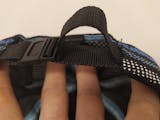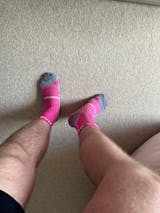Hello Runners!
How is your week ahead looking? As we move closer to the big day, the training is growing, the possibility of missing a few runs grows. So this week we are talking about how to get back on track if that happens.
I’d happily make a guess that no runner has ever followed a training plan perfectly, there are just so many variables that can get in the way. People pick up niggles, get sidelined, winter training usually means battling colds and the flu, sometimes we just don’t fancy it and of course there’s family time, work deadlines and holidays.. the list is endless!
For this week's long read I’ve answered a few common questions, then below I’ve written a quick guide to help you get back on plan depending on how much time you’ve had off from running. So let’s get to it..
---
Should I go back and do the runs I’ve missed?
Many runners will panic if they miss a run, then try and make up those miles somewhere else. In my eyes this is a surefire way of picking up a niggle, because the last thing you want to do when the body is feeling a little weaker is to throw a higher training load at it.
If you miss a run, I’d be inclined to say to just let it go, move on and focus on what’s coming up next.
----
I’m worried about the fitness I’ve lost or will lose, how can I stop that?
It’s only natural to go into panic mode, when you realise you can’t or haven’t run for whatever reason. But don’t panic as you have plenty of time to get things right before losing fitness.
While of course it’s true that you won’t be adding fitness if you aren’t training, you also won’t necessarily be losing that much either, well not as much as you might think. Most runners can take 7 days off running before any reduction in fitness takes effect. So if you have to miss a few runs here and there then don’t panic.
The first run back after a bit of a break might feel a bit sluggish, but after a few runs you’ll quickly be back to feeling where you were before.
----
I feel guilty about missing run? Or I’m worried I’ll now miss my time?
When we take time away, I find it's the mental side of our running that suffers the most. While our body is having time out (and no doubt benefiting from the recovery!) our brain inevitably goes into over-drive, by analysing everything and it takes a big confidence knock about whether we can achieve our goals.
Dealing with a bigger injury, something like a stress fracture, is hard.. don’t get me wrong, not every reason for having time away is the same (you might like to read my blog post on the mental side of dealing with bigger injuries here.. )
But fear not. Take a look back over all the training you have achieved, all those miles banked. As we saw above, fitness takes longer to decline that you might have realised. Hitting our goal time is mostly based around building a consistent training block and missing a handful of runs, all be it frustrating, won’t impact that.
----
What should I do if I'm injured?
With any injury or potential injury, it’s always worth seeking professional advice from a physio or sports doctor.
That way it will give you a plan of what to do and how to get back up and running again.
Of course there are so many areas we can work on outside of the actual running part such as reading and race day research etc. And as long as your physio says it's ok to do so, you can help keep your fitness levels up by cross training, doing some swimming or cycling as well as some other strength training or yoga. It will mean that it wont be such a big shock to the system when you do start running again.
----
So with all that in mind, how should we get back to running?
----
Missing a training run
If you miss a run, don't worry about it. For marathon training the long run is the most important one of the week, so try your upmost to get that one in if possible. (Obviously not if you’re injured) You might want to move one of the others around to get your long run, making sure you have a recovery period planned after it.
----
Missing 3 days to a week
Providing you have built up a good level of fitness and consistency up until your break then you shouldn’t be losing fitness over this period. Your legs might feel lethargic on your first couple of runs back, but that should quickly disappear. I’d suggest keeping all your runs at a low intensity ‘easy’ pace for the first 3-4 days, while sticking to the planned distances. Then if everything is feeling good after 3-4 days, return to the plan as normal, just be sure to listen to your body and don’t push too soon.
----
A week to two weeks of no running
You may have lost a slight amount of fitness so I’d suggest running most of your runs at an easy pace for the first week back just to get back into the swing of things. If you are following a plan, drop the mileage by 10%-20% of whatever it says to give your body chance to ease back in. If you wanted to add some strides (short bursts of 100m at 90% effort, with a 30 seconds rest, usually done after a easy run) then they build strength, while not adding much fatigue and are a good way of coming back.
----
More than two weeks off
By this stage you will have lost some fitness, so it’s going to take a couple of weeks to build safely back up to where you were.
Again concentrate on your easy runs, with strides and some hills repeats after 5-7 days.
Drop your mileage by 20-30% from the recommended amount for week 1, 10% for week 2, then you should be good to get back on plan after that.
----
Like so much in running, there is no perfect solution and people will all be slightly different. The most important thing to getting back on track is listening to your body and adapting your training to how you are feeling. It’s important to note that our muscles and bones adapt at different rates, so jumping straight back into full training after a prolonged time off can cause excess stress on our bones. So take it easy, there’s no harm in dropping the intensity for a few days and come back safely.
Not one run, or workout will ever make a great race.. you are trying to achieve consistency over the whole training cycle.
Feel free to ask any questions below and I’ll do my best to answer them!
Here’s to a great week of training ahead,
All the very best
Ben












